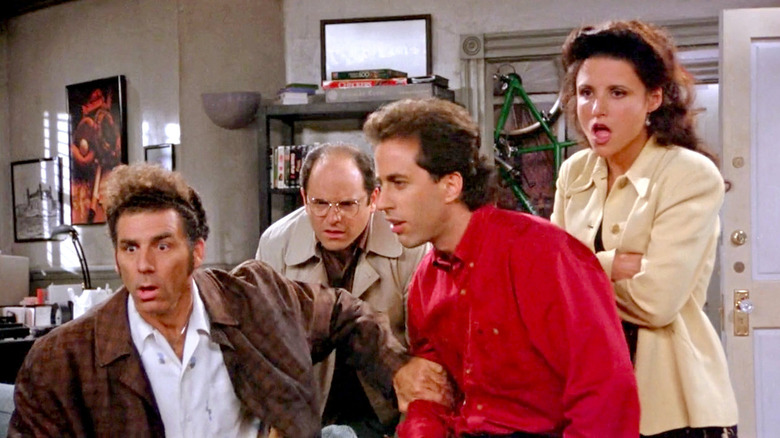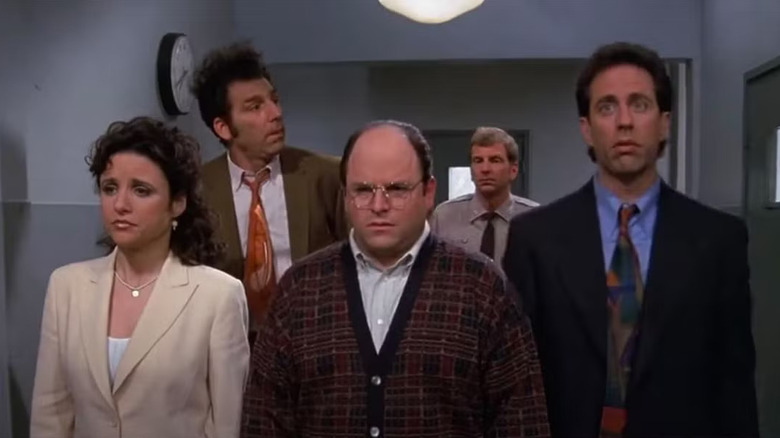How Cheers' Creator Thinks Seinfeld Changed Comedy Forever
Prior to about 1987, American sitcoms were — generally speaking — very different. No matter the premise or intended demographic, most sitcoms (and, again, this is a wide generality) focused on a reliable comedic structure of set-ups and payoffs. From "I Love Lucy" all the way to "Diff'rent Strokes," sitcom writers were careful to explore a recognizable domestic/workplace/common setting environment through sharply recognized, very funny characters. The same writers were typically also careful to lay out gags and jokes very clearly. Every setup usually led to some kind of punchline or payoff.
In the late 1980s, however, sitcoms underwent a reckoning. It seems that audiences and many longtime writers became tired of the decades of well-worm tropes and structures, and they began to deconstruct. 1987 saw the debut of "Married... With Children," a sitcom that followed an aggressively dysfunctional family who all kind of hated each other. Their causticness was the joke. Then, in 1989, "The Simpsons" debuted, handily satirizing all sitcoms that came before it by offering a semi-surreal, yellow-hued parallel sitcom universe where everything was a little askew.
1989 also saw the debut of "Seinfeld," the show that pretty much slammed the door shut on old-fashioned sitcoms. As the show's creators, Larry David and Jerry Seinfeld have repeatedly said, "Seinfeld" was a show about nothing, and they mandated that none of its characters were to become sentimental, hug, or learn any lessons. The show was based on Seinfeld's own brand of observational humor and petty grievances.
Glen Charles was the co-creator of the 1982 hit sitcom "Cheers" (along with his brother Les and Jimmy Burrows), and he recalls with clarity the shift from punchline-based humor writing in sitcoms to the "Seinfeld"-inspired observational writing that eventually took over. Back in 2012, Charles spoke to GQ magazine about the sea change and felt that comedy at large suffered as a result.
Glen Charles hated that 'Seinfeld' had no traditional punchlines
Standup comedy had long skewed away from traditional setups and punchlines by the late 1980s. Indeed, as observed in the film "The Aristocrats," comedians rarely got on stage to tell traditional jokes anymore, as the practice was seen as a relic of borscht-belt comedy of the 1950s and 1960s. Jerry Seinfeld's style of humor was self-deprecating, and based on tiny personal inconveniences that everyone might relate to. This is why so many Jerry Seinfeld jokes begin with the phrase "What is the deal with...?" Seinfeld saw something out in the world that he found inherently illogical, and found humor in its absurdity. Life, he was declaring, is kind of meaningless, and the structures around us are to be pondered as equally meaningless.
That humor was carried over into "Seinfeld," and the writers of "Cheers" didn't like that. Glen Charles didn't like that petty grievance was the point. There was no comment offered with observational humor, just that the comedian noticed something. Charles was especially incensed when Seinfeld's style of humor took over the rest of comedy. He said:
"For better or for worse, I see more of S'einfeld's' influence now [on comedy] ... not joke-jokes, but people airing very personal, subjective issues, and sometimes things close without even a joke. We never would have done that. We'd be there until two in the morning, making sure it had a button on the act. I'm not making a value judgment. It just seems to be more of a trend now."
Indeed, watching older sitcoms, one can see that they are typically more "writerly." The structure is more solid from scene to scene, and the characters all have miniature arcs. There is sympathy, drama, and story in Charles' traditions. Seinfeld dispensed with those traditions, presenting characters that couldn't learn and couldn't have arcs.
But "Seinfeld" at least knew its characters were horrible people. The final episode of the series put them all on trial for their crimes of selfishness and pettiness. They ended the series in jail. One might wonder how Charles felt about that.

